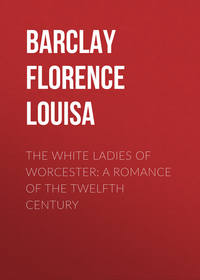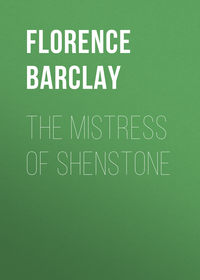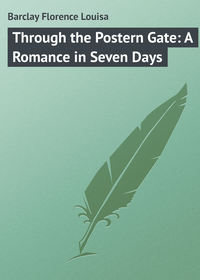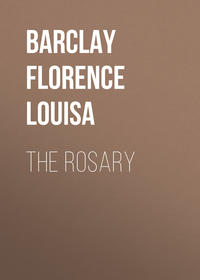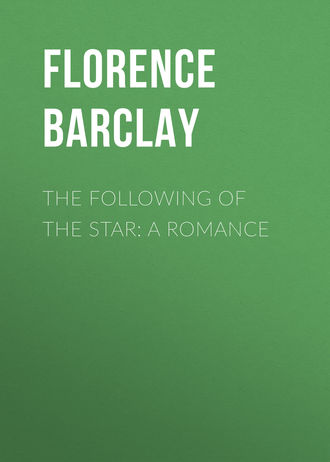 полная версия
полная версияThe Following of the Star: A Romance
David lay back in the motor and wondered whether life would ever hold for him a scene so enchanting as that first Christmas-tree, or a gift so priceless as that popgun-flute.
The motor sped through the old-world town of Riversmead, scarcely slacking speed, for the streets were clear; all its inhabitants were indoors, merry-making; and the one policeman they passed, saluted. Diana's car was well-known and respected.
Then in at great iron gates, standing wide, and up an avenue of stately beeches, coming to sudden pause before the portico of a large stone house, gay with lighted windows.
CHAPTER VI
DAVID MAKES FRIENDS WITH "CHAPPIE"
The door into the great hall opened as David stepped out of the motor. A footman took his overcoat, and he found himself following an elderly butler across the spacious hall toward a door, which he flung open, announcing in confidential tones: "The Reverend David Rivers"; then stood aside, that David might enter.
David had already been looking right and left for Chappie; and, even as he walked into the drawing-room, he had a seductive whistle ready in case the poodle came to meet him, before he could reach Diana's friendly hand.
But neither Diana nor the poodle were in the drawing-room.
Instead, on a large sofa, at right angles with the fireplace, in the midst of heaped up cushions, sat a very plump elderly lady, of haughty mien, clad in claret-coloured velvet, a nodding ornament in her white hair, and much jewellery on her fat neck. She raised a lorgnon, on a long tortoiseshell handle, and looked through it at David as he advanced toward her.
There was such awe-inspiring majesty in the action, that David felt certain she must be, at the very least, a duchess.
He seemed to be hours in reaching the sofa. It was like one of those long walks taken in dreams, covering miles, yet only advancing yards; and as he walked his clerical jacket grew shorter, and his boots more patently not patent leather.
When, at last, he reached the hearthrug – nothing happened. The plump lady had, apparently, no disengaged hand; one held the lorgnon; the other, a large feather fan.
"D'y do?" she said, in a rather husky voice. "I conclude you are Diana's missionary."
This was an almost impossible remark to answer. David was not Diana's missionary; yet he was, undoubtedly, the missionary Diana had asked to dinner.
In his embarrassment he held his warm hands to the blaze of the log-fire, and said: "What a beautiful Christmas-day!"
The plump lady ignored the remark. She declined to recognise anything in common between her Christmas-day and David's.
"Where is your sphere of work?" she demanded, hoarsely.
"Central Africa," replied David, in a meek voice, devoutly wishing himself back there.
At that moment the door burst open, by reason of a bump against it, and a black poodle trotted in, identical with the dog of David's imagining, excepting that its tufts were tied up with red ribbon.
David whistled joyfully. "Hullo, Chappie!" he said. "Come here, old fellow."
The poodle paused, surprised, and looked at him; one fore-paw uplifted.
The plump lady made an inarticulate sound, and dropped her lorgnon.
But David felt sure of his ground. "Come on, Chappie," he said. "Let's be friends."
The poodle trotted up and shook hands. David bent down and patted his beautiful coat.
Then Diana herself swept into the room. "A thousand pardons, Cousin David!" she cried. "I should have been down to receive you. But Knox broke all records and did the distance in eighteen minutes!" In a moment her hand was in his; her eyes were dancing with pleasure; her smile enveloped him in an atmosphere of welcoming friendliness.
All David's shyness left him. He forgot his terror of the majestic person on the sofa. "Oh, that's all right" he said. "I have been making friends with Chappie."
For a moment even Diana looked nonplussed. Then she laughed gaily. "I ought to have been down to introduce you properly," she said. "Let me do so now. Cousin David, this is Mrs. Marmaduke Vane. Chappie dear, may I present to you my cousin, David Rivers?"
David never knew why the floor did not open and swallow him up! He looked helplessly at Diana, and hopelessly at the plump lady on the sofa, whose wrathful glance withered him.
Diana flew to the rescue. "Now, Chappie dear," she said, "the motor is at the door, and Marie has your fur cloak in the hall. Remember me to the Brackenburys, and don't feel obliged to come away early if you are enjoying the games after dinner. The brougham will call for you at eleven; but James can put up, and come round when you send for him. If I have gone up when you return, we shall meet at breakfast." She helped the plump lady to her feet, and took her to the door. "Good-bye, dear; and have a good time."
She closed the door, and came back to David, standing petrified on the hearthrug.
"Mrs. Vane is my chaperon," she explained. "That is why I call her 'Chappie.' But – tell me, Cousin David; do you always call elderly ladies by their rather private pet-names, in the first moments of making their acquaintance?"
"Heaven help me!" said poor David, ruefully, "I thought 'Chappie' was the poodle."
Diana's peals of laughter must have reached the irate lady in the hall. She sank on to the sofa, and buried her golden head in the cushions.
"Oh, Cousin David!" she said. "I always knew you were unlike anybody else. Did you see the concentrated fury in Chappie's eye? And shall we improve matters by explaining that you thought she was the poodle? Oh, talk of something else, or I shall suffocate!"
"But you said: 'There will only be myself and Chappie; and Chappie doesn't count,'" explained David. "If that was 'Chappie,' she counts a lot. She looked me up and down, until I felt positively cheap; and she asked me whether I was your missionary. I made sure she was a duchess, at the very least."
"That only shows how very little experience you have had of duchesses, Cousin David. If Chappie had really been a duchess, she would have made you feel at home in a moment, and I should have found you seated beside her on the sofa talking as happily as if you had known her for years. Chappie has a presence, I admit; and a ducal air; which is partly why I keep her on as chaperon. But she says: 'D'y do,' and looks down her nose at you in that critical manner, because her father was only a doctor in a small provincial town."
"My father was a doctor in a little country village," said David, quickly, "yet I hope I don't look down my nose at people."
"Ah," said Diana, "but then you are a man, and no foolish friends have told you that you look like a duchess, thus turning your poor head. Chappie is a kind old thing, at heart, and must have attractive qualities of sorts, seeing she has been married no less than three times. She was my governess, years ago, before her first marriage. And when Uncle Falcon died, I had her back as chaperon; partly because she is very poor, and couples with that poverty an inordinate love of creature comforts, which is quite pathetic; partly because she makes an imposing figure-head, yet I can do with her exactly as I like. How would you define a chaperon, Cousin David?"
"We don't have them in Central Africa, Miss Rivers."
"Well, a chaperon is a person who should be seen and not heard. And she should be seen by the right people; not by those she is chaperoning, but by the tiresome people who think they ought to be chaperoned. My good Chappie satisfactorily fulfils these conditions. She is, to all intents, chaperoning you and me, this evening; yet, in reality, she is dining with friends of hers in Riversmead; thus sparing us the unnecessary restraint of her presence, and the undesirable infliction of her quite mindless conversation."
David found himself wondering whether he ought not to have allowed Sarah to tell him "one or two things about Miss Diana," before he adventured over to Riverscourt.
At that moment the staid butler opened wide the door, with a murmured sentence about dinner.
Diana rose, with a gentle grace and dignity which reminded David of his Lady of Mystery's first progress up Brambledene church; and, laying her hand within his arm, guided him to the dining-room.
A small round table stood in the centre of the great oak-panelled room. It gleamed with glass and silver, wax candles and snowy linen. The decoration was Parma violets and lilies of the valley.
David sat at Diana's right hand, and when she leaned toward him and they talked in low voices, the old man at the distant sideboard could not overhear their conversation.
The poodle had followed them to the dining-room, and lay down contentedly in front of the log-fire.
Diana was wearing perfectly plain white satin. A Medici collar, embroidered with pearls, rose at the back of her shapely head. She wore violets at her bosom, and a dainty wreath of violets in her hair. Her gown in front was cut square and low, and embroidered with pearls. On the whiteness of her skin, below the beautiful firm neck, sparkled a brilliant diamond star. David hated to see it there; he could hardly have explained why. It rose and fell lightly, with her breathing. When she laughed, it scintillated in the light of the wax candles. It fascinated David – the sparkling star, on the soft flesh. He looked at it, and looked away; but again it drew his unwilling eyes.
He tried to master his aversion. Why should not Miss Rivers wear a diamond star? Why should he, David, presume to dislike to see a star so worn?
Before they reached the second course, Diana said to the butler: "Send Marie to me."
In a few moments her French maid, in simple black attire, with softly braided hair, stood at her elbow. Diana, still talking gaily to David, lifted both arms, unclasped the thin gold chain from about her neck, and handed the pendant to her maid.
"Serrez-moi ça," she said, carelessly.
Then she turned her clear eyes on David. "You prefer it in the sky," she said. "I quite agree with you. A woman's flesh savours too much of the world and the devil, to be a resting-place for stars. It can have no possible connection with ideals."
She spoke so bitterly, that David's tender heart rose up in arms.
"True, I prefer it in the sky," he said, "and I prefer it not of diamonds. But I do not like to hear you speak so of – of your body. It seems to me too perfectly beautiful to be thus relegated to a lower sphere; not because it is not flesh; but because, though flesh, it clothes a radiant soul. The mortal body is but the garment of the immortal soul. The soul, in mounting, lifts the body with it."
"I do not agree with you," said Diana. "I loathe bodies; my own, no less than other people's. And how little we know of our souls. I am afraid I shall shock you, Cousin David, but a favourite theory of mine is: that only a certain number of people have any souls at all. I have always maintained that the heathen have no souls."
David's deep eyes gleamed.
"The young natives of Uganda," he said, "sooner than give up their new-found faith, sooner than deny the Lord Who had bought them, walked calmly to the stake, and were slowly roasted by fire; their limbs, while they yet lived, being hacked off, one by one, and thrown into the flames. Their holy courage never failed; their last articulate words were utterances of faith and praise. Surely bodies would hardly go through so much, unless souls– strong immortal souls – dwelt within them."
"True," said Diana, softly. "Cousin David, I apologise. And I wonder how many of us would stand such a soul-test as slow-fire. I can't quite imagine Chappie, seated on a gridiron, singing hymns! Can you?"
"We must not judge another," said David, rather stiffly. "Conditions of martyrdom, produced the noble army of martyrs. Why should not Mrs. Vane, if placed in those conditions, rise to the occasion?"
"I am certain she would," said Diana. "She would rise quite rapidly, – if the occasion were a gridiron."
Much against his will, David burst out laughing.
Diana leaned her chin in her hands; her luminous grey eyes observed him, gravely. Little dimples of enjoyment dented either cheek; but her tone was entirely demure.
"I hope you are not a prig, Cousin David," she said, gravely.
"I have never been considered one," replied David, humbly. "But, if you say so – "
"No, no!" cried Diana. "You are not a prig; and I know I am flippant beyond words. Have you found out that I am flippant, Cousin David?"
"Yes," he said, gently. "But I have found out something besides that."
Her eyes challenged him.
"And that is – ?"
"That you take refuge in flippancy, Miss Rivers, when you want to hide a deeper anxiety and earnestness of soul than you can quite understand, or altogether cope with."
"Really? Then you must explain it to me, and cope with it for me. I hope our Christmas dinner has come up to the dinner of Sarah's intentions. Have another pear; or some more nuts? I did not order crackers, because we are both grown up, and we should look so foolish in paper caps; and yet, if we had had them, we could not have resisted putting them on. Don't you know, at children's parties, the way in which grown-ups seize upon the most outré of the coloured head-gear, don them, in a moment of gay abandonment, and – forget them! I can remember now, the delight, after one of the Christmas parties in my childhood, of seeing Chappie go gravely in to say good-night to grandpapa, completely unconscious of a Glengarry bonnet, tilted waggishly on one side, or, on another occasion, of a tall peaked fool's cap, perched on her frizzled 'transformation'. Oh, to be a little child again, each Christmas-day! Yet here am I – twenty-eight! How old are you, Cousin David?.. Twenty-nine? Well, I am glad you are not quite thirty. Being in another decade would have been like being in a cassock… Why a cassock? How dense you are, my reverend cousin! My mildest jokes require explaining. Why because it would have removed you so far away, and I want you quite near this evening, not perched in a distant pulpit! You cannot really help me, unless you fully sympathise and understand. And I am in such sore straits, Cousin David, that I look upon myself as a drowning man – why do we always say 'drowning man' as if there never were any drowning women? – about to sink for the third time; and you as the rope, which constitutes my only hope of safety. Let us go to the drawing-room."
CHAPTER VII
THE TOUCH OF POWER
As they passed into the drawing-room, David's eye fell on a grand piano, in black ebony case, to the left of the doorway.
"Oh!" said David, and stopped short.
"Does that tempt you?" asked Diana. "Yes; I might have known you were full of music. Your sufferings, over the performances of the Brambledene choir, were more patent than you realised."
David's fingers were working eagerly.
"I so rarely get the chance of a piano," he said. "Like chaperons, we don't have them in Central Africa. I went without all manner of things to be able to afford one in my rooms at college; but, since then – Is it a Bechstein, or what?"
"I really do not know," laughed Diana. "It is an article of furniture I do not use. Once a quarter, it lifts up its voice, poor dear, when a sleek person with a key of his own, arrives unexpectedly, asking for a duster, and announcing that he has come to tune it. He usually turns up when I have a luncheon party. Occasionally when Chappie is feeling low, and dwelling on the departed Marmaduke, she feels moved to play 'Home, Sweet Home'; but when Chappie plays 'Home, Sweet Home' you instantly discover that 'there's no place like' – being out; and, be it ever so cheerless, you catch up a hat, and flee! You may carry off the piano to Africa, if you will, Cousin David. And, meanwhile, see how you like it now, while I try to collect my ideas, and consider how best to lay my difficulties before you."
She moved across the long room, to the fireplace, drew forward a low chair, turning it so as to face the distant piano.
David, tingling with anticipation, opened the instrument with reverent care.
"It is a Bechstein," he said; then took his seat; pausing a moment, his hands upon his knees, his dark head bent over the keys.
Diana, watching him, laughed in her heart.
"What an infant it is, in some ways," she thought. "I do believe he is saying: 'For what we are about to receive'!" But, in another minute her laughter ceased. She was receiving more than she had expected. David had laid his hands upon the keys; and, straightway, the room was filled with music.
It did not seem to come from the piano. It did not appear to have any special connection with David. It came chiefly from an unseen purple sky overhead; not the murky darkness of an English winter, but the clear over-arching heavens of the Eastern desert – expansive, vast, fathomless.
Beneath it, rode a cavalcade of travellers – anxious, perplexed, uncertain. She could hear the soft thud of the camels' feet upon the sand, and see the slow swaying, back and forth, of the mysterious riders.
Suddenly outshone a star, – clear, luminous, divine; so brilliant, so unexpected, that the listener by the fireplace said, "Oh!" – then laid her hand over her trembling lips.
But David had forgotten her. His eyes were shining; his thin face, aglow.
Now all was peace and certainty. They travelled on. They reached Jerusalem. The minor key of doubt and disappointment crept in again. Then, once more, shone the star. They arrived at Bethlehem. In chords of royal harmony they found the King. O worship the Lord in the beauty of holiness!
Diana's face sank into her clasped hands. The firelight played upon her golden hair.
She knew, now, just how far she had wandered from the one true Light; just how poor had been her response to the eternal love which brought the Lord of glory to the manger of Bethlehem; to the village home at Nazareth; to the cross of Calvary. The love of Christ had not constrained her. She had lived for self. Her heart had grown hard and unresponsive.
And now, in tenderest, reverent melody, the precious gifts were being offered – gold, frankincense, and myrrh. But, what had she to offer? Her gold could hardly be accepted while she withheld herself. Yet how could love awaken in a heart so dead, so filled with worldly scorn and unbelief?
The music had changed. It no longer came from unseen skies, or ranged back into past scenes, and ancient history. It centred in David, and the piano.
He was playing a theme so simple and so restful, that it stole into Diana's heart, bringing untold hope and comfort. At length, she lifted her head.
"What are you playing, now, Cousin David?" She asked, gently.
David hushed the air into a whisper, as he answered: "A very simple setting, of my own, to those wonderful words, 'At even, e'er the sun was set.' You know them? The old tune never contented me. It was so apt to drag, and did not lend itself to the crescendo of hope and thankfulness required by the glad certainty that the need of each waiting heart would be fully met, nor to the diminuendo of perfect peace, enfolding each one as they went away. So I composed this simple melody, and I sing it, by myself, out in the African forests most nights, when my day's work is over. But it is a treat to be able to play it here, with full harmonies."
"Sing it to me," said Diana, gently.
And at once David began to sing, to his own setting, the tender words of the old evening hymn. And this was what he sang:
Holy Star"At even ere the sun was set"1. At even ere the sun was set,The sick, O Lord, around Thee lay;Oh, in what divers pains they met!Oh, with what joy they went away!2. Once more 'tis eventide, and weOppressed with various ills draw near;What if Thy Form we cannot see?We know and feel that Thou art here.3. O Saviour Christ, our woes dispel;For some are sick, and some are sad;And some have never loved Thee well,And some have lost the love they had;4. And some have found the world is vain,Yet from the world they break not free;And some have friends who give them pain,Yet have not sought a friend in Thee.5. And none, O Lord, have perfect rest,For none are wholly free from sin;And they who fain would serve Thee best,Are conscious most of sin within.6. O Saviour Christ, Thou too art Man;Thou hast been troubled, tempted, tried;Thy kind but searching glance can scanThe very wounds that shame would hide.7. Thy touch has still its ancient power;No word from Thee can fruitless fall;Hear in this solemn evening hour,And in Thy mercy heal us all;O heal us all!The pure tenor voice rose and fell, giving full value to each line. As he reached the words: "And some have never loved Thee well, And some have lost the love they had," Diana's tears fell, silently. It was so true – so true. She had never loved Him well; and she had lost what little faith, what little hope, she had.
Presently David's voice arose in glad tones of certainty:
"Thy touch has still its ancient power;No word from Thee can fruitless fall;Hear, in this solemn evening hour,And, in Thy mercy, heal us all;Oh, heal us all."The last notes of the quiet Amen, died away.
David closed the piano softly; rose, and walked over to the fireplace. He did not look at Diana; he did not speak to her. He knew, instinctively, that a soul in travail was beside him. He left her to his Lord.
After a while she whispered: "If only one were worthy. If only one's faith were strong enough to realise, and to believe."
"Our worthiness has nothing to do with it," said David, without looking round. "And we need not worry about our faith, so long as – like the tiny mustard seed – it is, however small, a living, growing thing. The whole point lies in the fact of the power of His touch; the changeless truth of His unfailing word; the fathomless ocean of His love and mercy. Look away from self; fix your eyes on Him; and healing comes."
A long silence followed David's words. He stood with his back to her, watching the great logs as the flames played round them, and they sank slowly, one by one, into the hot ashes.
At last he heard Diana's voice.
"Cousin David," she said, "will you give me your blessing?"
David Rivers turned. He was young; he was humble; he was very simple in his faith; but he realised the value and responsibility of his priestly office. He knew it had been given him as "a service of gift."
He lifted his hands, and as Diana sank to her knees, he laid them reverently upon the golden corona of her hair.
One moment of silence. Then David's voice, vibrant with emotion, yet deep, tender, and unfaltering, pronounced the great Triune blessing, granted to desert wanderers of old.
"The Lord bless thee and keep thee;The Lord make His face shine upon thee, and be gracious unto thee;The Lord lift up His countenance upon thee, and give thee peace."And the touch of power which Diana felt upon her heart and life, from that moment onward, was not the touch of David Rivers.
CHAPTER VIII
THE TEST OF THE TRUE HERALD
As David sped back through the starry darkness, he was filled with an exultation such as he had never before experienced.
He had always held that every immortal soul was of equal value in the sight of God; and that the bringing into the kingdom of an untutored African savage, was of as much importance, in the Divine estimation, as the conversion of the proudest potentate ruling upon any European throne.
But, somehow, he realised now the greatness of the victory which grace had won, in this surrender of Diana to the constraining touch of his Lord and hers.
It was one thing to see light dawn, where all had hitherto been darkness; but quite another to see the dispersion of clouds of cynical unbelief, and the surrender of a strong personality to the faith which requires the simple loving obedience of a little child: for, "whosoever shall not receive the kingdom of God as a little child, he shall not enter therein."
David leaned back in the motor, totally unconscious of his surroundings, as he realised how great a conquest for his King was this winning of Diana. Her immense wealth, her influence, her position in the county, her undoubted personal charm, would all now be consecrated, and become a power on the side of right.


